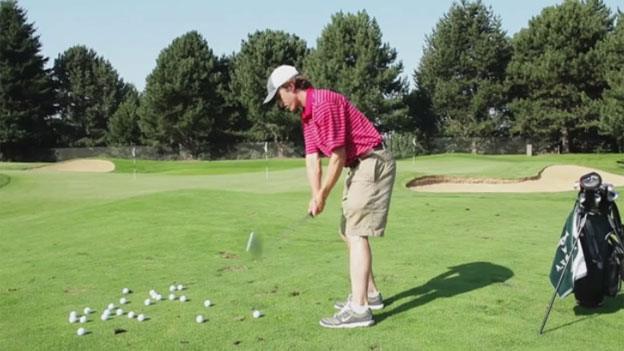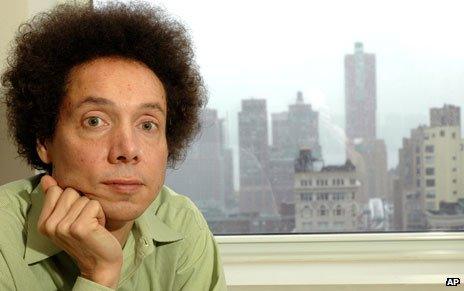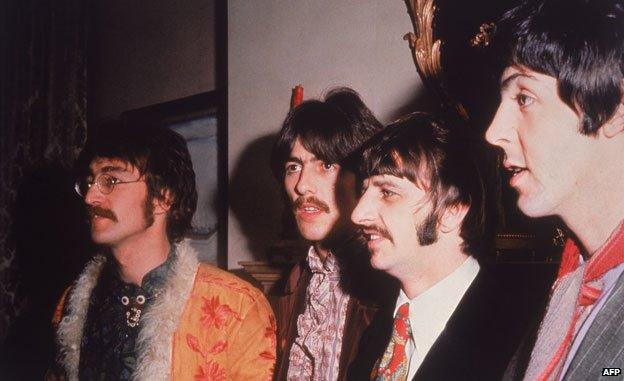Can 10,000 hours of practice make you an expert?
- Published

A much-touted theory suggests that practising any skill for 10,000 hours is sufficient to make you an expert. No innate talent? Not a problem. You just practice. But is it true?
One man who decided to test it is Dan McLaughlin, 34, a former commercial photographer from Portland, Oregon.
"The idea came in 2009. I was visiting my brother and we decided to play a par three, nine-hole course," he says. "I had never really been on a golf course and went out and shot a 57, which is horrible. It's 30 over par on an easy nine-hole course."
Far from being discouraged by his apparent lack of any natural talent for golf, Dan and his brother started talking about what it would take to become a professional golfer. Dan soon decided he wanted to try.
"When I announced I was going to quit my job, my co-workers started bringing books in and I read Malcolm Gladwell's Outliers, Geoff Colvin's Talent is Overrated and The Talent Code by Daniel Coyle," he says. "These books all had this idea of 10,000 hours in them."
The 10,000-hours concept can be traced back to a 1993 paper written by Anders Ericsson, a Professor at the University of Colorado, called The Role of Deliberate Practice in the Acquisition of Expert Performance.
It highlighted the work of a group of psychologists in Berlin, who had studied the practice habits of violin students in childhood, adolescence and adulthood.
All had begun playing at roughly five years of age with similar practice times. However, at age eight, practice times began to diverge. By age 20, the elite performers had averaged more than 10,000 hours of practice each, while the less able performers had only done 4,000 hours of practice.
The psychologists didn't see any naturally gifted performers emerge and this surprised them. If natural talent had played a role it wouldn't have been unreasonable to expect gifted performers to emerge after, say, 5,000 hours.
Anders Ericsson concluded that "many characteristics once believed to reflect innate talent are actually the result of intense practice extended for a minimum of 10 years".
It is Malcolm Gladwell's hugely popular book, Outliers, that is largely responsible for introducing "the 10,000-hour rule" to a mass audience - it's the name of one of the chapters.

Gladwell puts greater emphasis than Ericsson on natural talent
But Ericsson was not pleased. He wrote a rebuttal paper in 2012, called The Danger of Delegating Education to Journalists.
"The 10,000-hour rule was invented by Malcolm Gladwell who stated that, 'Researchers have settled on what they believe is the magic number for true expertise: 10,000 hours.' Gladwell cited our research on expert musicians as a stimulus for his provocative generalisation to a magical number," Ericsson writes.
Ericsson then pointed out that 10,000 was an average, and that many of the best musicians in his study had accumulated "substantially fewer" hours of practice. He underlined, also, that the quality of the practice was important.
"In contrast, Gladwell does not even mention the concept of deliberate practice," Ericsson writes.
Gladwell counters that Ericsson doesn't really think that talent exists.
"When he disagrees with the way I interpreted his work, it's because I disagree with him," he says.
"I think that being very, very good at something requires a big healthy dose of natural talent. And when I talk about the Beatles - they had masses of natural talent. They were born geniuses. Ericsson wouldn't say that.
"Ericsson, if you read some of his writings, is... saying the right kind of practice is sufficient."

Talented or just hard workers?
Gladwell places himself roughly in the middle of a sliding scale with Ericsson at one end, placing little emphasis on the role of natural talent, and at the other end a writer such as David Epstein, author of the The Sports Gene. Epstein is "a bit more of a talent person than me" Gladwell suggests.
One of the difficulties with assessing whether expert-level performance can be obtained just through practice is that most studies are done after the subjects have reached that level.
It would be better to follow the progress of someone with no innate talent in a particular discipline who chooses to complete 10,000 hours of deliberate practice in it.
And we can, thanks to our wannabe professional golfer, Dan McLaughlin.
"I began the plan in April 2010 and I basically putted from one foot and slowly worked away from the hole," he says.
"Eighteen months into it I hit my first driver and now it's approaching four years and I'm about half way. So I'm 5,000 hours into the project. My current handicap is right at a 4.1 and the goal is to get down to a plus handicap [below zero] where I have the skill set to compete in a legitimate PGA tour event."
David Epstein hopes that McLaughlin can reach his goal, but he has some doubts. In the sporting world innate ability is mandatory, he believes.
A recent study of baseball players, Epstein points out, found that the average player had 20/13 vision as opposed to normal 20/20 vision. What this means is that they can see at 20 feet what a normal person would need to be at 13 feet to see clearly. That gives a hitter an enormous advantage when it comes to striking a ball being thrown towards them at 95mph from 60 feet (or 153km/h from 18m).
Using an analogy from computing, Epstein says the hardware is someone's visual acuity - or the physiology of their eye that they cannot change - while the software is the set of skills they learn by many, many hours of practice.
"No matter how good their vision is, it's like a laptop with only the hardware - with no programmes on it, it's useless. But once they've downloaded that software, once they have learned those sports-specific skills, the better the hardware is the better the total machine is going to be."
But is there a simpler way to think about all this? Maybe talented people just practise more and try harder at the thing they're already good at - because they enjoy it?
"Imagine being in calculus class on your first day and the teacher being at the board writing an equation, and you look at it and think 'Wow, that's the most beautiful thing I've ever seen,' which some people do," says Gladwell.
"For those people to go home and do two hours of calculus homework is thrilling, whereas for the rest of us it's beyond a chore and more like a nightmare.
"Those that have done the two hours' practice come in the following day and everything is easier than it is for those who didn't enjoy it in the first place and didn't do the two hours' homework."
What Dan McLaughlin is hoping is that what he lacks in innate talent he more than makes up for with his 10,000 hours of deliberate practice.
If Dan's plan goes well he could be mixing it with the likes of Tiger Woods and Rory McIlroy in 2018. If not, he will just be a very good golfer.
Follow @BBCNewsMagazine, external on Twitter and on Facebook, external